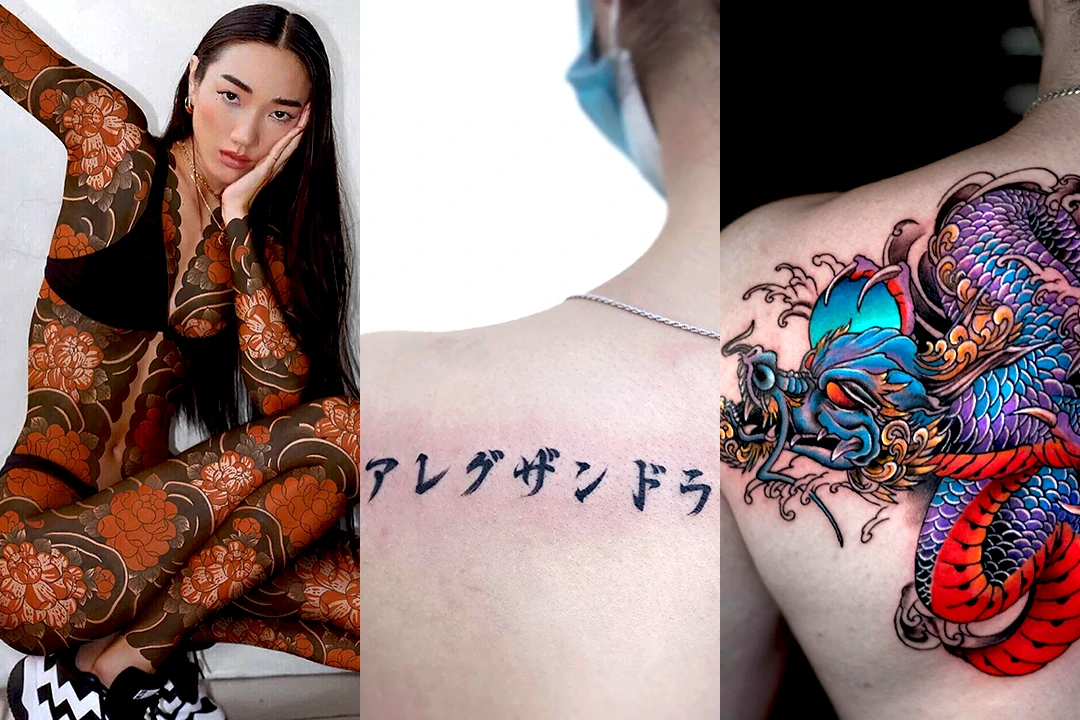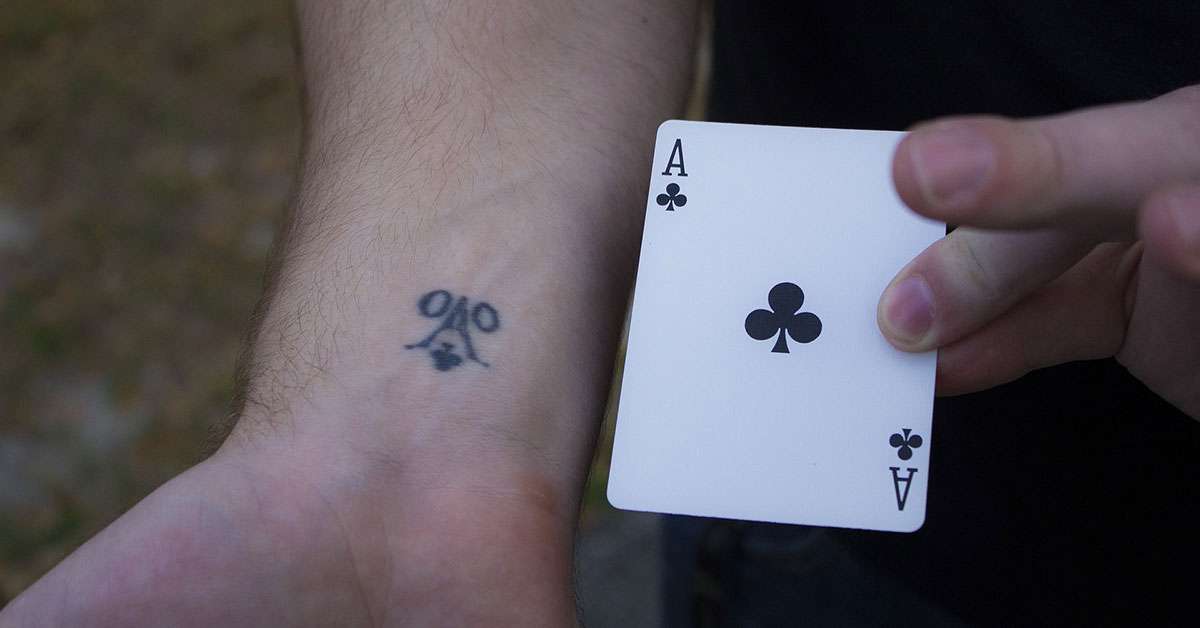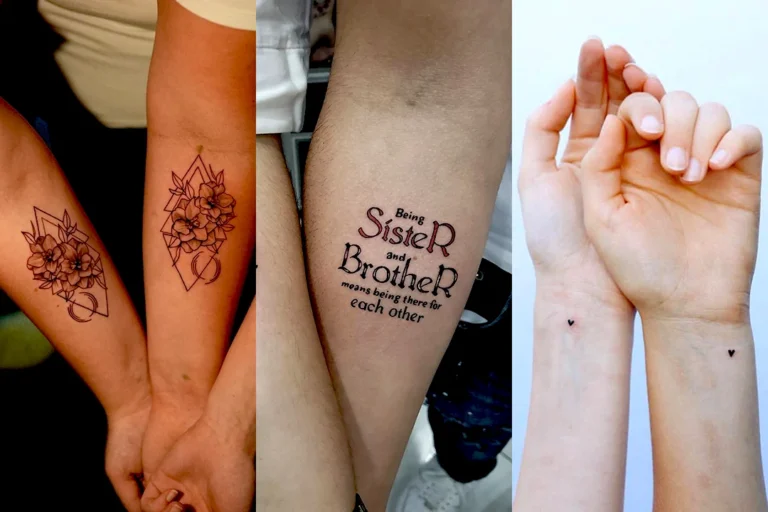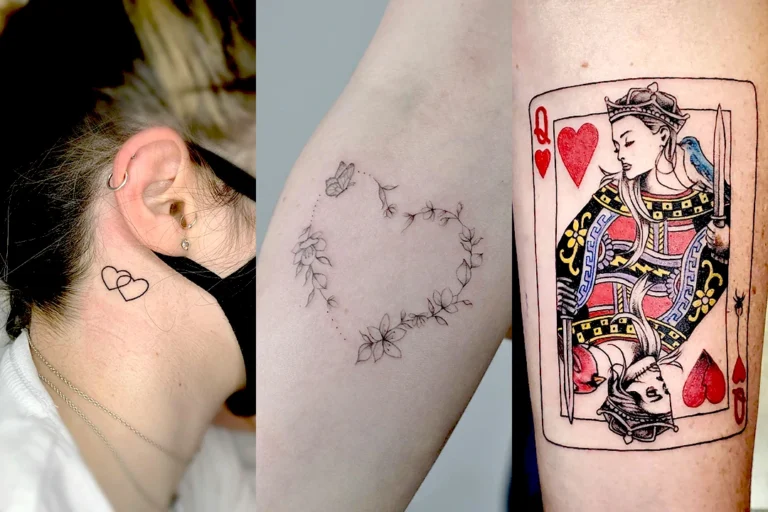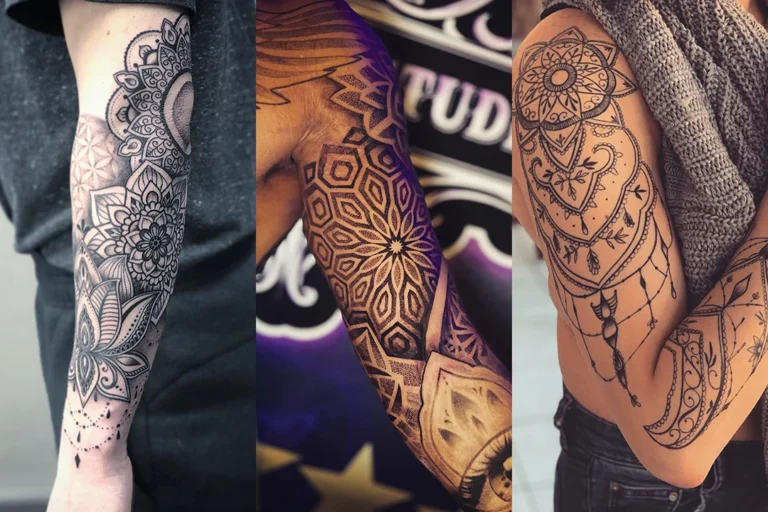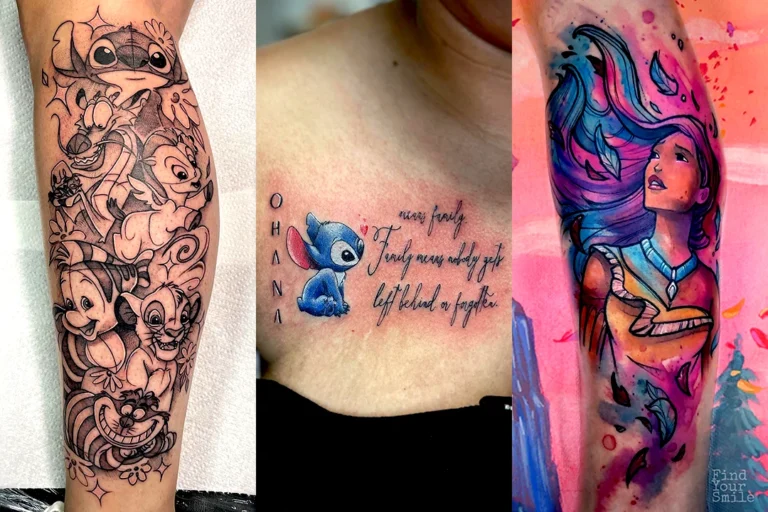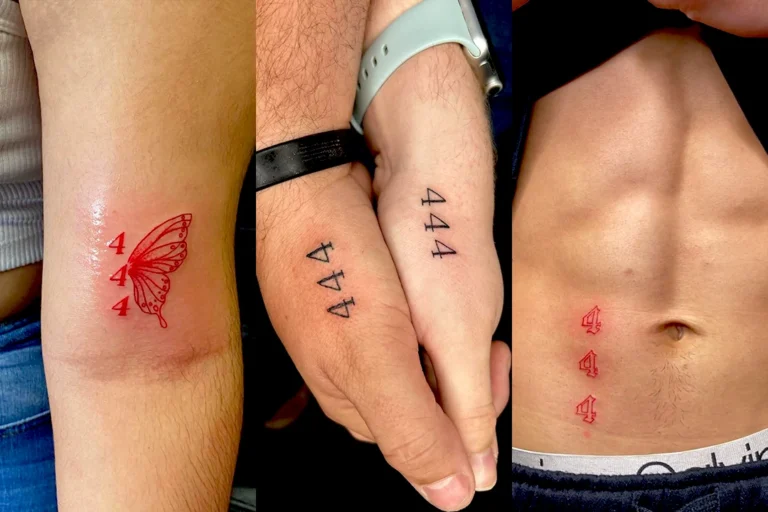Delving into the world of Japanese tattoo ideas opens up a rich tapestry of culture, history, and symbolism that has captivated the fascination of many around the globe. These intricate designs, deeply rooted in tradition and storytelling, offer more than just aesthetic appeal; they embody meaning, identity, and a profound sense of belonging. Whether you’re drawn to the bold lines of traditional Japanese tattoo designs or the subtle elegance of Japanese women’s tattoos, exploring this art form offers a unique way to connect with the cultural heritage of Japan while expressing your own story.
In this comprehensive guide, we aim to unravel the complexities and beauty of Japanese tattoos, including Japanese tattoo designs, symbols, and the stories they tell. We’ll delve into the popular styles that have influenced both traditional and modern interpretations, highlight the most iconic motifs found in these tattoos, and discuss the profound meanings behind them. From Japanese-style tattoo ideas that are rich in history to contemporary interpretations that blend ancient symbolism with modern artistry, our journey will arm you with the knowledge needed to choose a tattoo that resonates with you on a deeper level.
Whether you’re seeking meaningful Japanese tattoos or are captivated by the allure of Japanese-style tattoos, join us as we explore the vast world of Japanese tattoo ideas.
Japanese Tattoo Ideas and their meanings
Japanese tattoo designs are known for their intricate details and rich symbolism. Each design element carries a specific meaning, making Japanese tattoos highly personal and unique. Let’s explore some popular Japanese tattoo ideas and their meanings:
Japanese flower tattoo
Flowers hold a significant place in Japanese culture and are often depicted in tattoo designs. Cherry blossoms, lotus flowers, and chrysanthemums are the most common choices for Japanese flower tattoos. Cherry blossoms symbolize the transient nature of life and beauty, while lotus flowers represent purity and spiritual enlightenment. Chrysanthemums are associated with autumn and symbolize longevity and rejuvenation.

Japanese sleeve tattoo
A sleeve tattoo is a large-scale design that covers the entire arm, from the shoulder to the wrist. Japanese sleeve tattoos often feature a combination of different elements, such as dragons, koi fish, waves, and cherry blossoms. These designs are highly detailed and can take multiple sessions to complete. Sleeve tattoos are a popular choice among those who want to show their commitment to Japanese tattoo art boldly.

Japanese tiger tattoo
Tigers hold great significance in Japanese culture and are a popular tattoo subject. In Japanese folklore, tigers are considered powerful and brave creatures. They symbolize strength, courage, and protection. Japanese tiger tattoos often depict the animal in a dynamic and fierce pose, surrounded by elements like waves or clouds. These tattoos are believed to bring strength and ward off evil spirits.

Japanese blossom flower tattoos
Cherry blossoms, also known as sakura, are one of the most iconic symbols of Japanese culture. They represent the beauty and fragility of life, as cherry blossoms bloom briefly before falling to the ground. Japanese blossom flower tattoos are often chosen to celebrate life’s transience and remind the wearer to live in the present moment.

Japanese snake tattoo
Snakes are a common motif in Japanese tattoo art and hold various meanings. In Japanese mythology, snakes are seen as guardians of hidden treasures associated with wisdom and protection. Snake tattoos can also represent transformation and rebirth, as snakes shed their skin. These tattoos are often depicted in a coiled or winding position, with intricate details and vibrant colors.
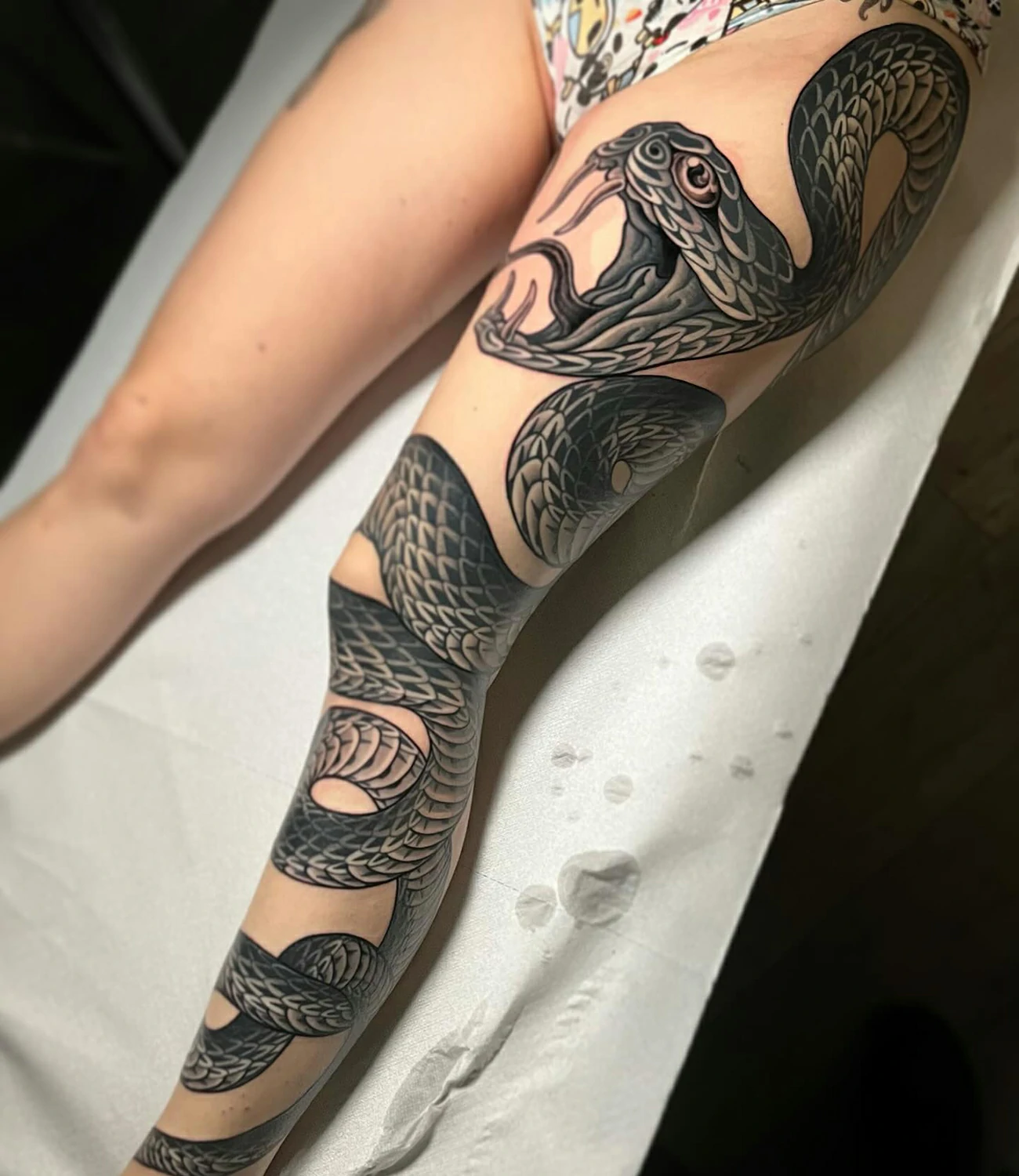
Japanese mask tattoo
Traditional Noh and Kabuki theater masks inspire Japanese mask tattoos. These masks represent different characters and emotions and are often used in performances to convey specific messages. Japanese mask tattoos symbolize the wearer’s ability to adapt to various situations and emotions. They are also associated with strength, resilience, and the ability to hide one’s true feelings.
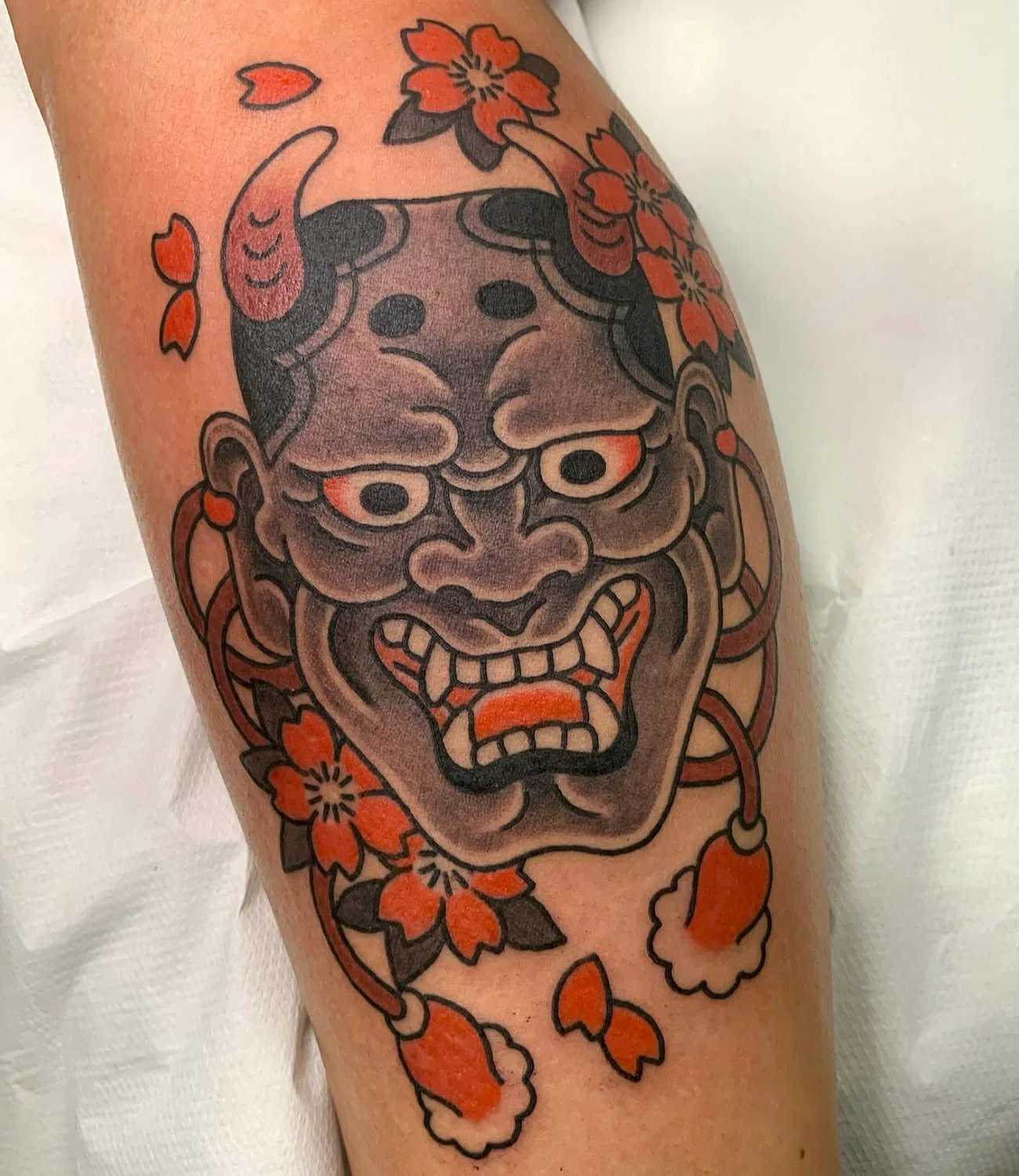
Japanese wording tattoo
Japanese wording tattoos, known as kanji tattoos, feature characters from the Japanese writing system. Each character carries its meaning, combining them can create powerful and meaningful messages. It is essential to research the meaning of the characters thoroughly before getting a Japanese wording tattoo to ensure it accurately reflects the intended message.
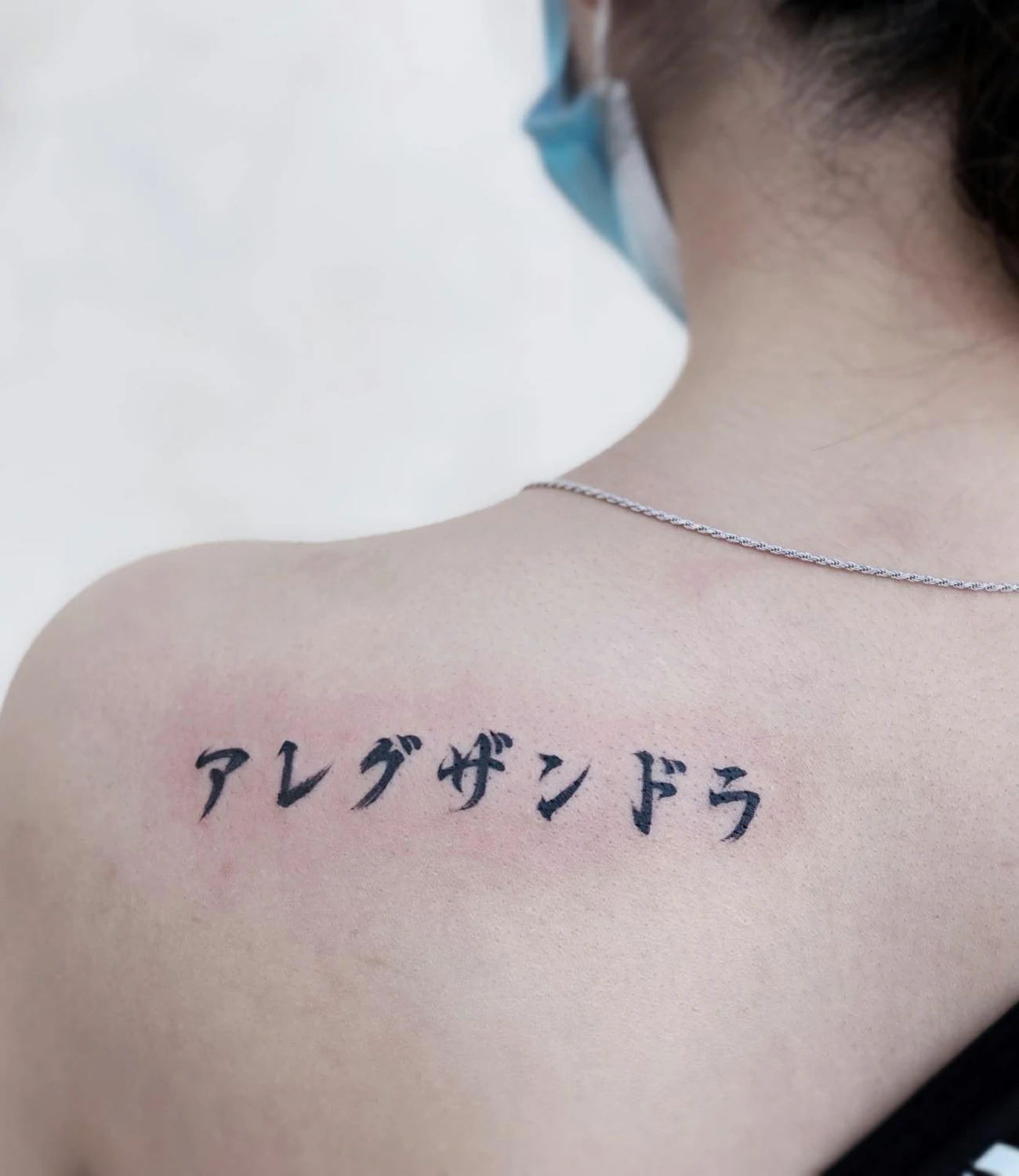
Japanese crane tattoo
Cranes are highly revered in Japanese culture and symbolize longevity, good fortune, and happiness. Japanese crane tattoos are often depicted in graceful, elegant poses with intricate details and vibrant colors. These tattoos are believed to bring luck and protection to the wearer and are a popular choice for those who seek a meaningful and visually stunning design.
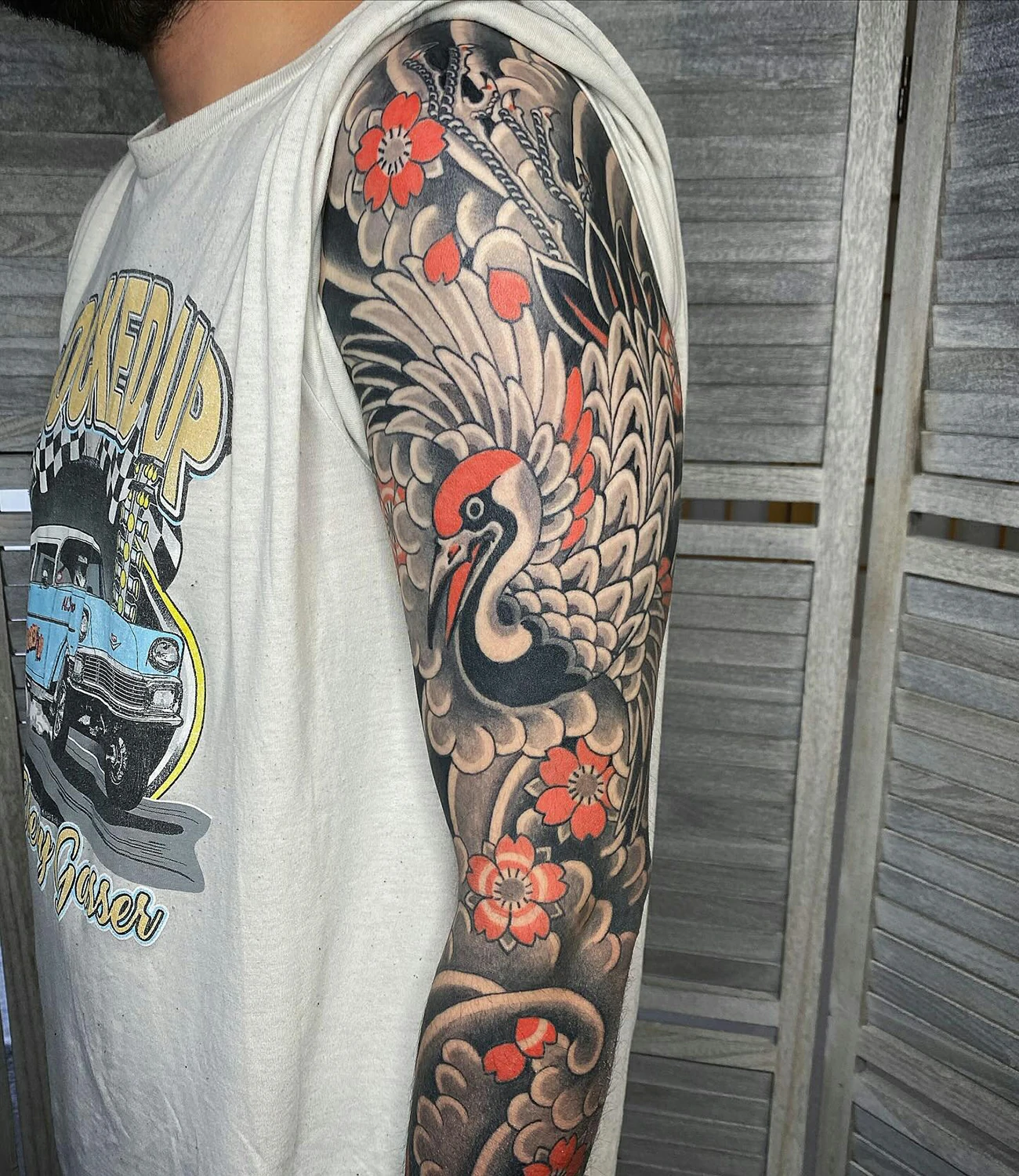
Small japanese tattoo ideas
Not all Japanese tattoos have to be large and elaborate. Small Japanese tattoos can be just as meaningful and impactful. These tattoos often feature a single symbol or character from the Japanese writing system, such as kanji or hiragana. Small Japanese tattoos are versatile and can be placed on various body parts, making them a popular choice for those who prefer a more subtle and discreet design.
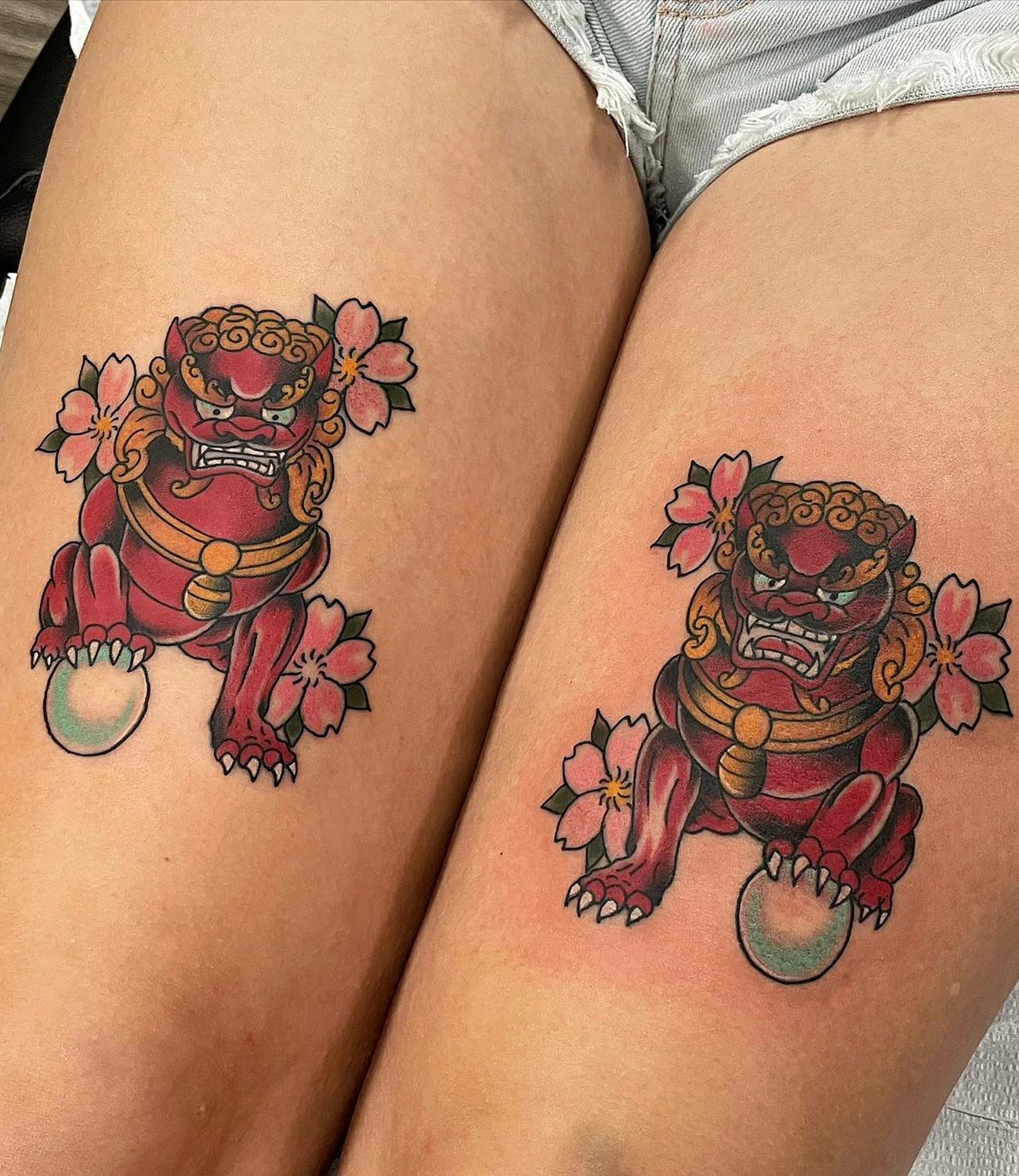
Japanese chest tattoo
Chest tattoos are a bold and powerful choice for those who want to make a statement. Japanese chest tattoos often feature large-scale designs that cover the entire chest area. These tattoos can depict various elements, including dragons, koi fish, samurai warriors, and cherry blossoms. Japanese chest tattoos are highly detailed and require a skilled artist to bring the design to life.
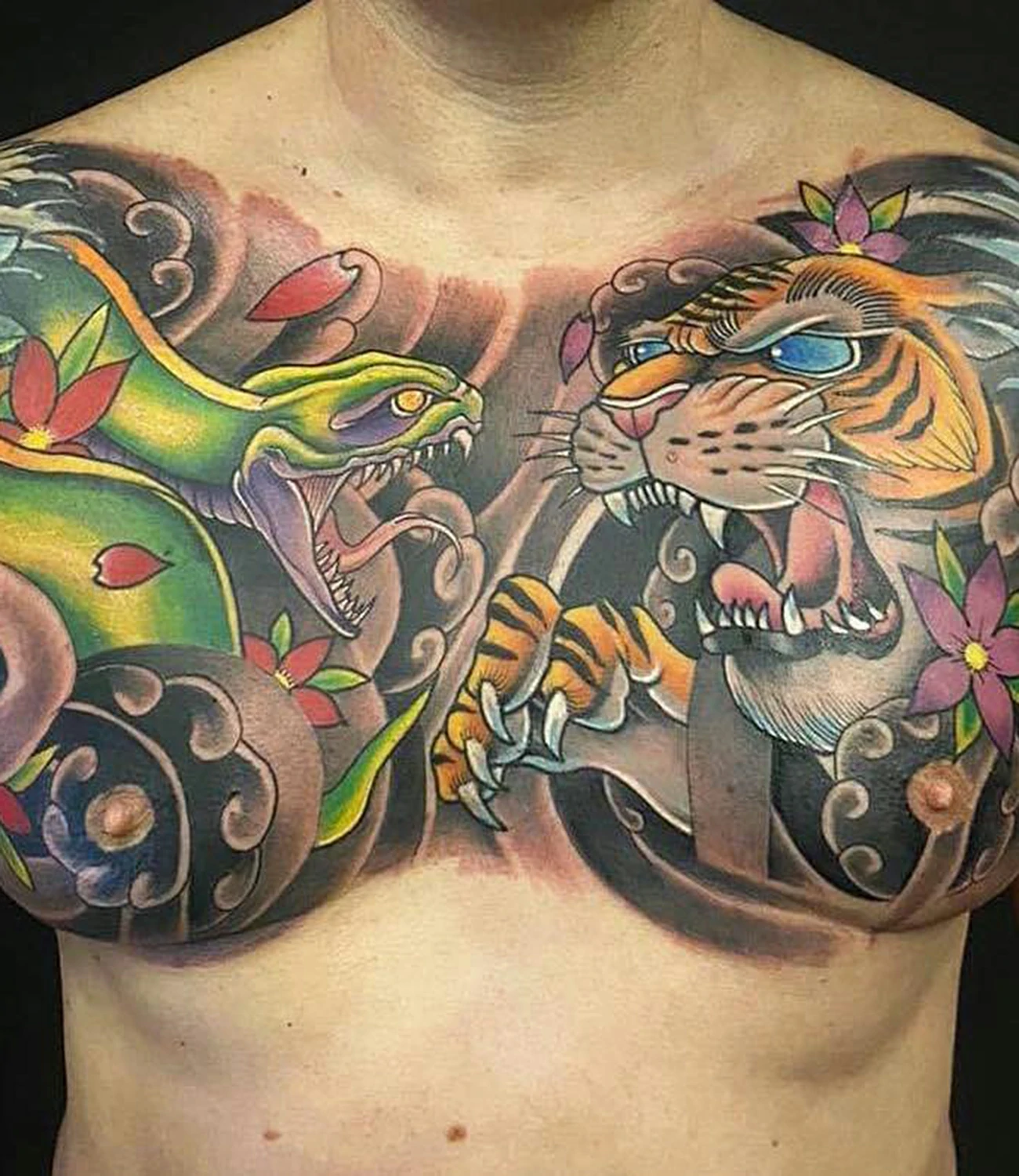
Japanese cloud tattoo
Clouds play a significant role in Japanese tattoo art and are often used as a background element to enhance the overall design. Japanese cloud tattoos can represent various meanings, including spirituality, freedom, and the transient nature of life. These tattoos are often depicted in vibrant colors and intricate patterns, creating a visually stunning and dynamic design.
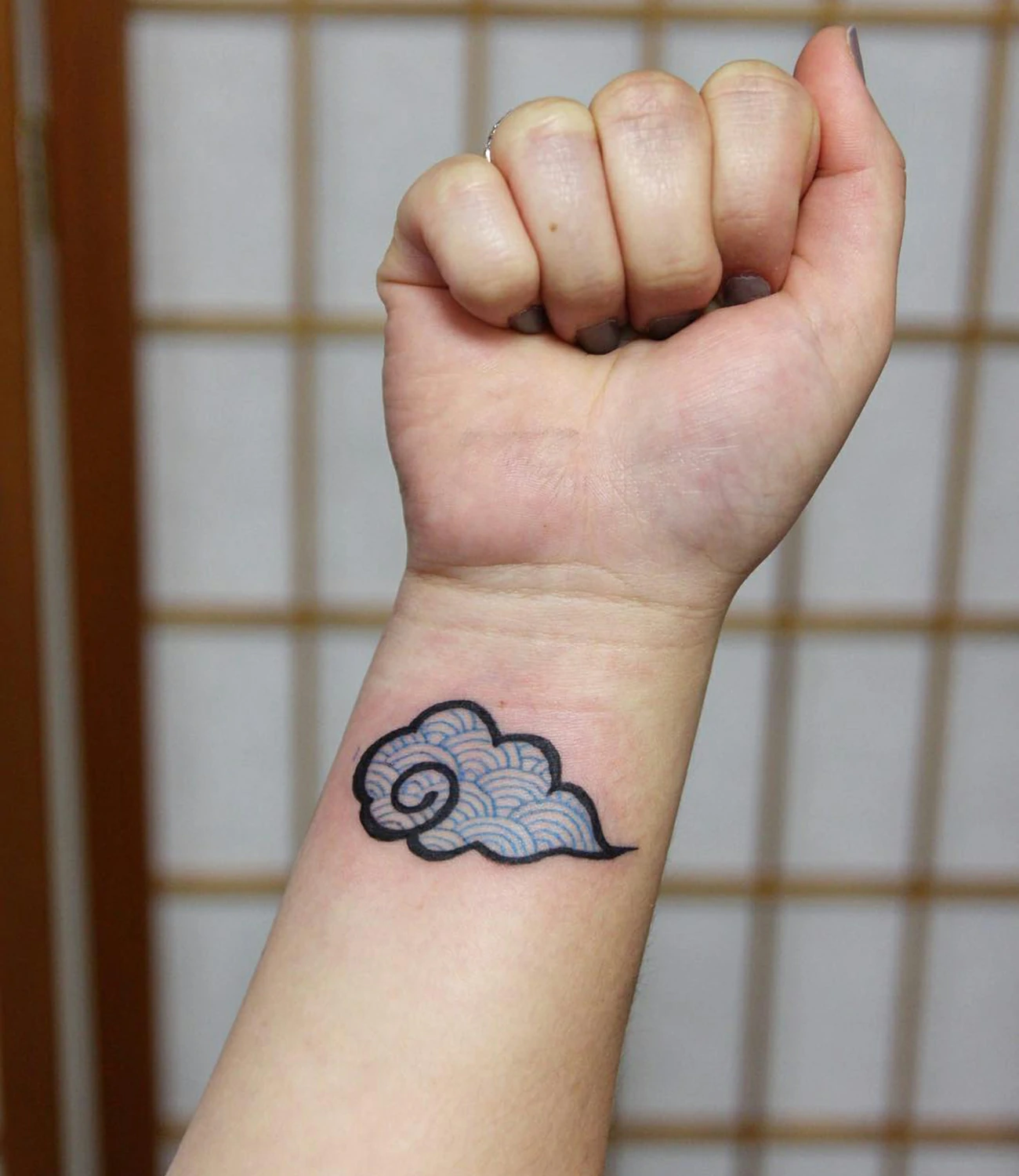
Japanese dragon tattoo designs
Dragons are a central figure in Japanese mythology and are highly revered. Japanese dragon tattoos symbolize power, strength, and wisdom. These tattoos often feature a dragon in a dynamic pose, surrounded by elements like waves or clouds. Dragon tattoos are a popular choice for those who want to embrace Japanese culture’s mythical and powerful aspects.

Japanese forearm tattoo
Forearm tattoos are a versatile and easily visible choice for those who want to showcase their Japanese tattoo art. Japanese forearm tattoos often feature a combination of different elements, such as flowers, animals, and traditional Japanese motifs. Depending on the wearer’s preferences, these tattoos can be highly detailed or more minimalist in design.
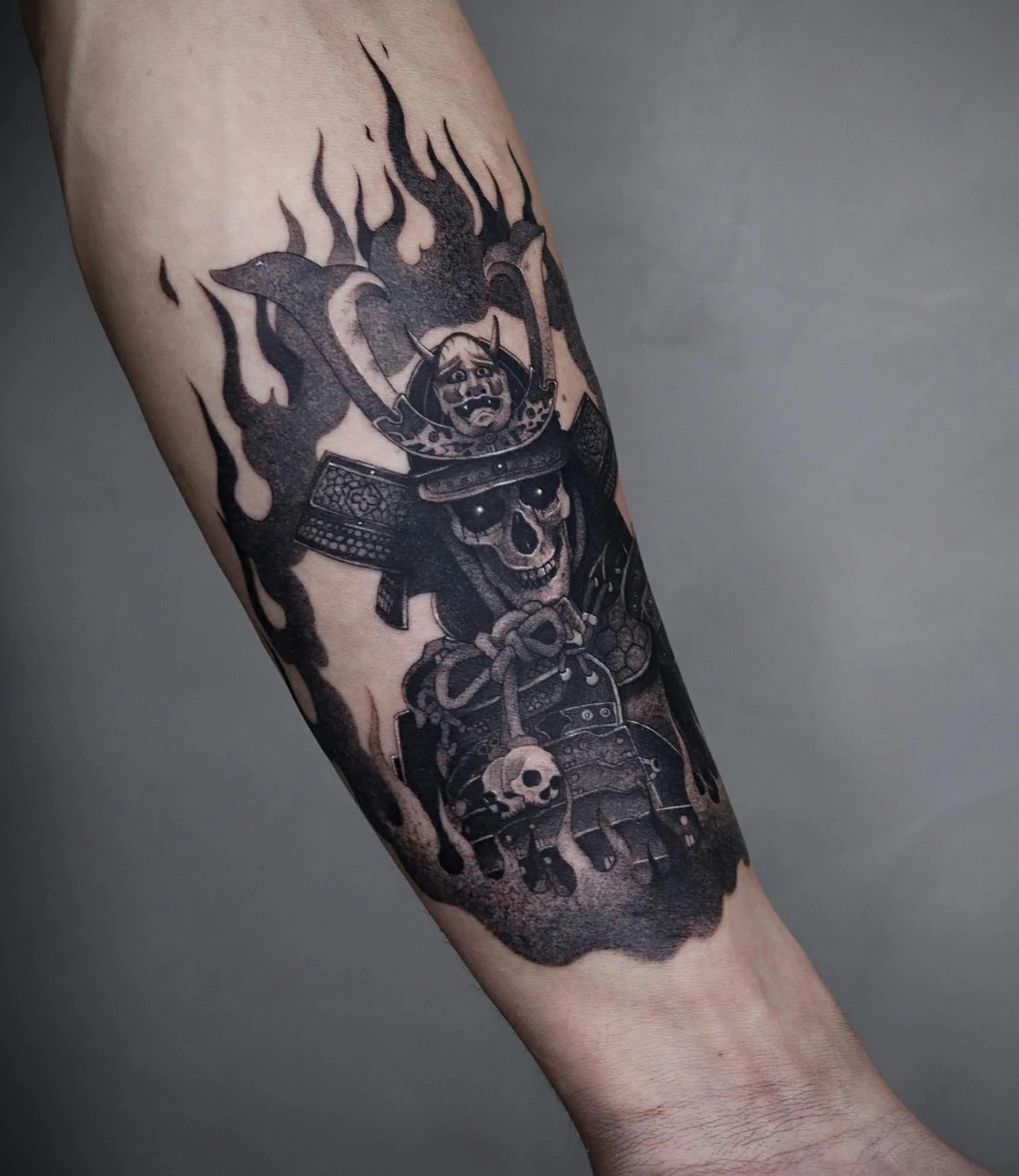
Japanese neck tattoo
Neck tattoos are a bold and daring choice for those who want to make a statement. Japanese neck tattoos often feature intricate and visually striking designs that extend from the neck to the shoulders or collarbone. These tattoos can depict various elements, including dragons, masks, and flowers. Japanese neck tattoos require careful consideration and a skilled artist to ensure the design complements the natural contours of the neck.
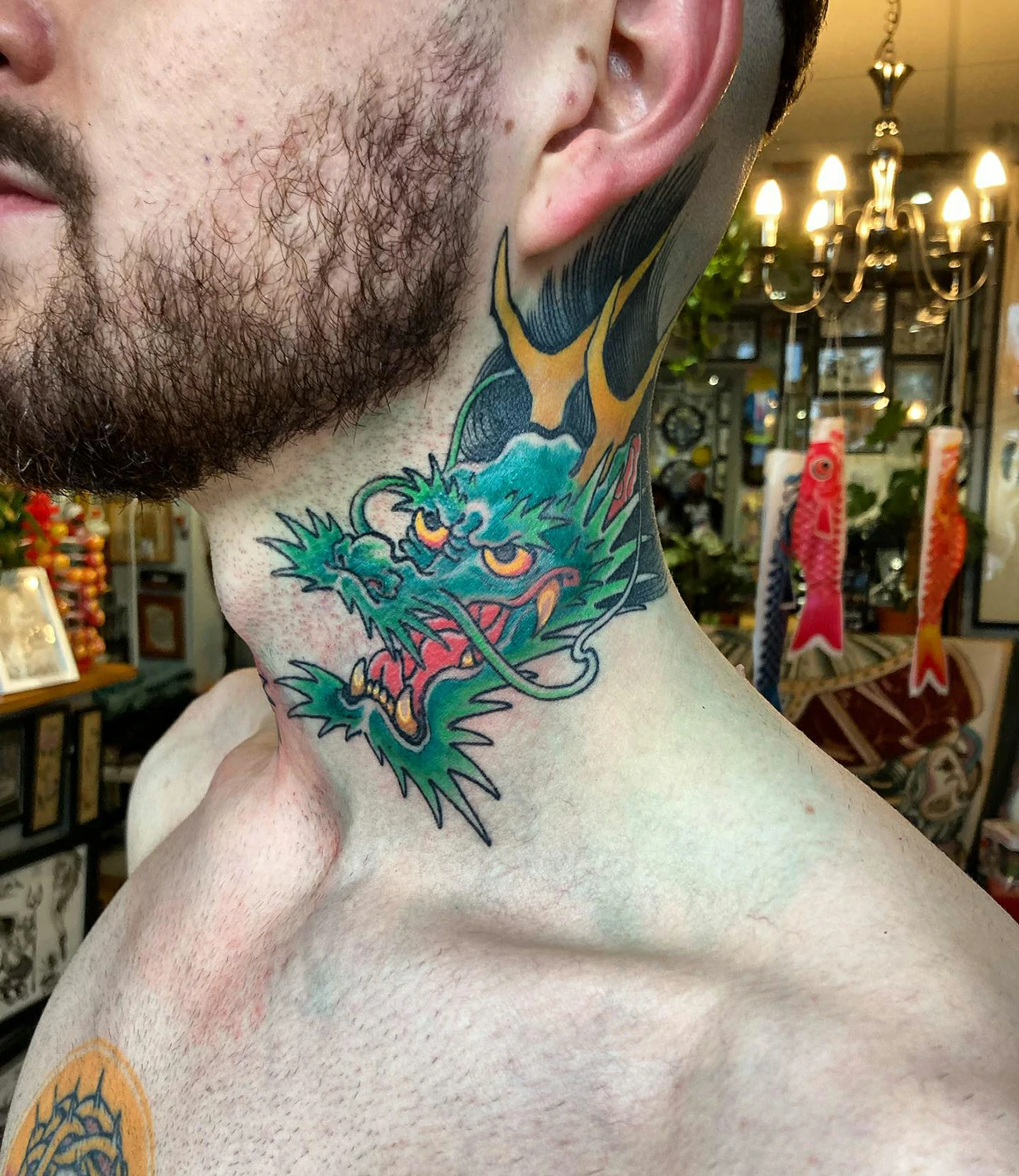
Japanese peony tattoo
Peonies are a popular flower in Japanese tattoo art and symbolize prosperity, good fortune, and honor. Japanese peony tattoos often feature vibrant colors and intricate details, capturing the beauty and elegance of these flowers. These tattoos are a popular choice for those who want to celebrate the abundance and success in their lives.
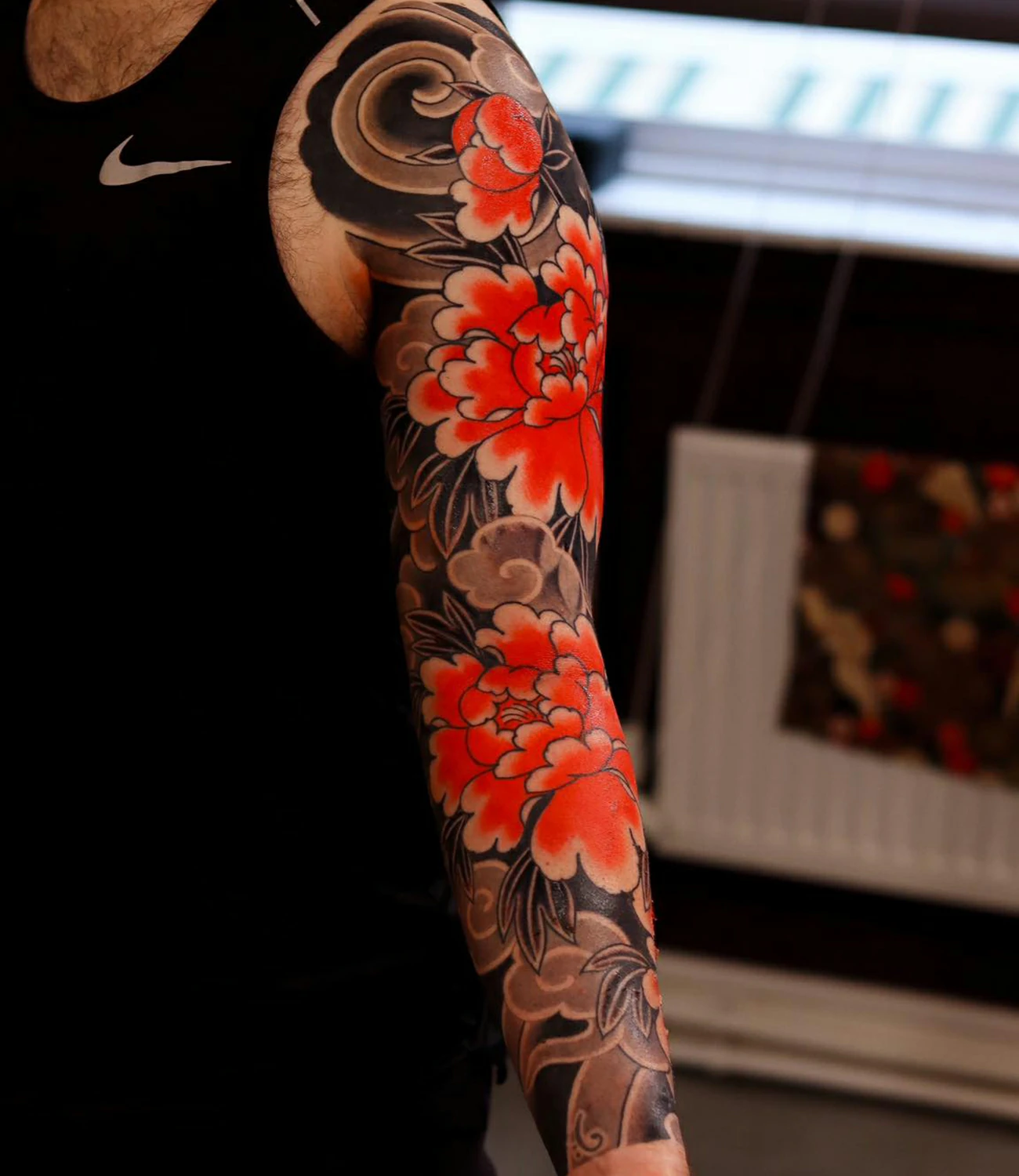
Tattoo Japanese waves
Waves are a prominent element in Japanese tattoo art and hold various meanings. Japanese wave tattoos can represent the power and unpredictability of nature, as well as the ebb and flow of life’s challenges. These tattoos often feature dynamic and powerful waves with intricate details and vibrant colors. Japanese wave tattoos are popular for those seeking a visually striking and symbolic design.
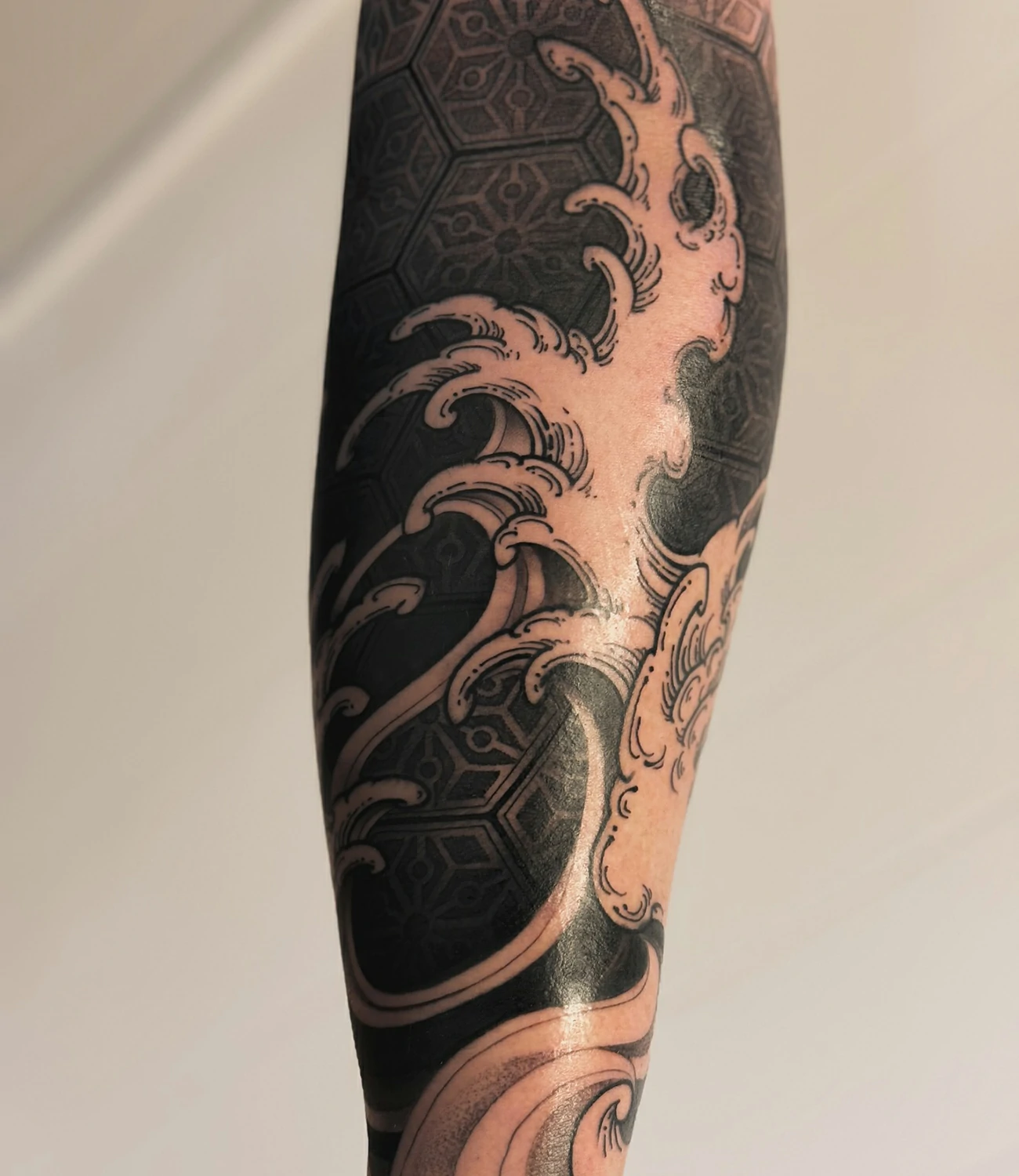
Tattoo lettering Japanese
Japanese lettering tattoos, known as kanji tattoos, feature characters from the Japanese writing system. Each character carries its meaning, combining them can create powerful and meaningful messages. It is essential to research the meaning of the characters thoroughly before getting a Japanese lettering tattoo to ensure it accurately reflects the intended message.
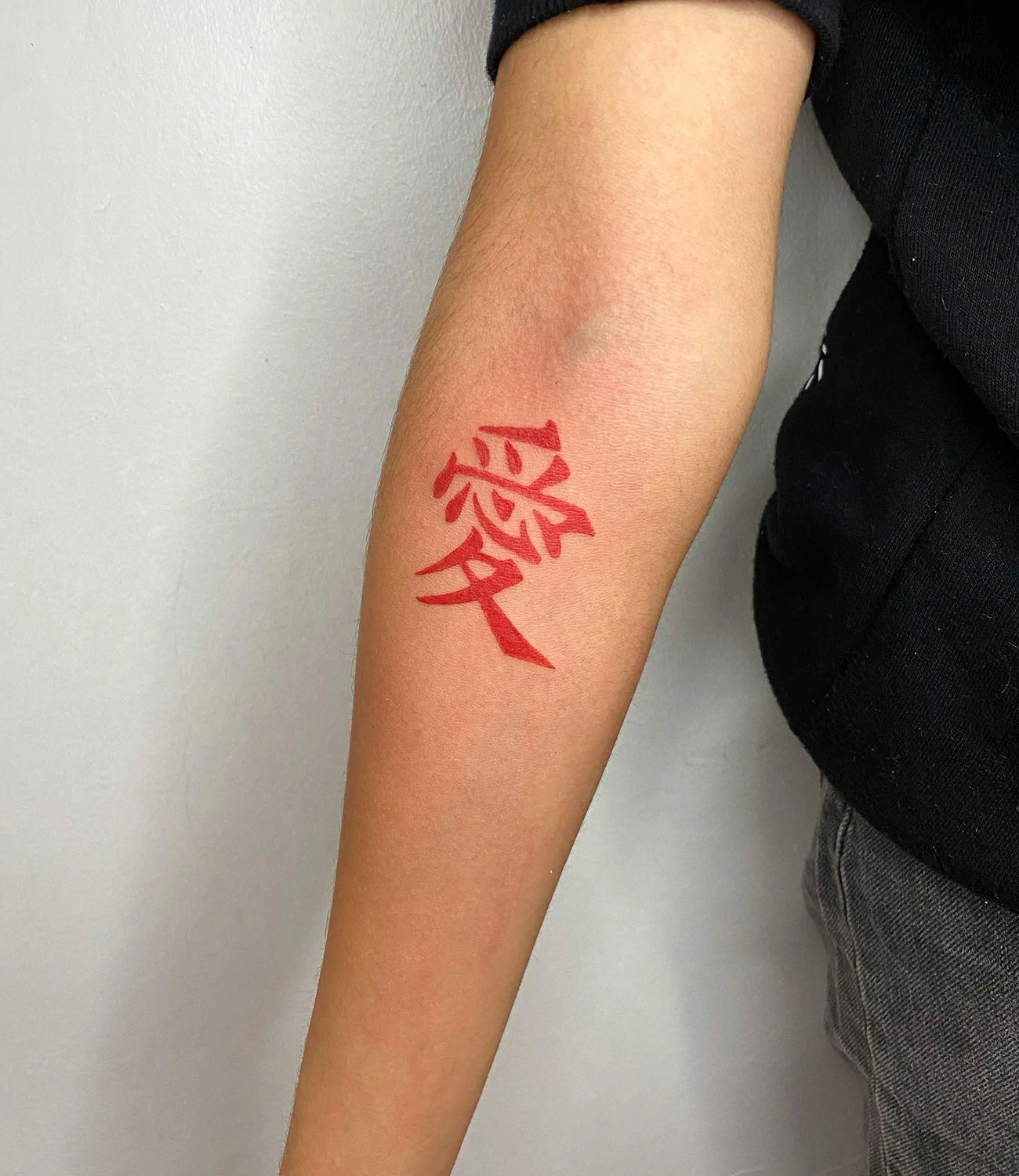
Japanese phoenix tattoo
The phoenix is a mythical bird that represents resurrection and rebirth. Japanese phoenix tattoos symbolize overcoming adversity and finding new beginnings. These tattoos often feature a majestic phoenix surrounded by flames, vibrant colors, and intricate details. Japanese phoenix tattoos are a powerful and meaningful choice for those who have overcome challenges or are seeking a fresh start.
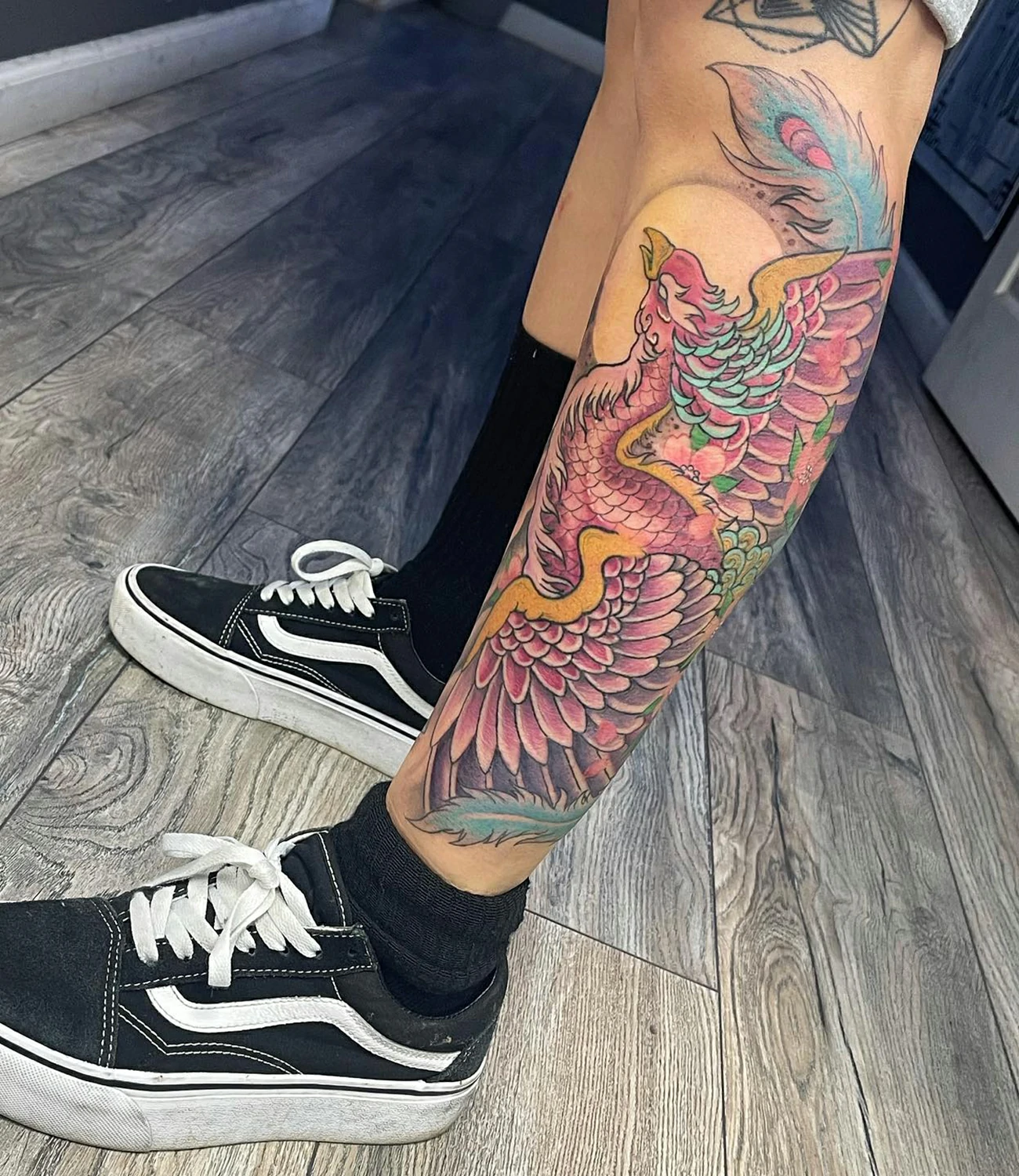
Japanese water tattoo
Water holds deep symbolism in Japanese culture and is associated with purity, cleansing, and renewal. Japanese water tattoos often feature flowing water, waves, or waterfalls with intricate details and vibrant colors. These tattoos can represent emotional healing, adaptability, and overcoming life’s challenges.

Japanese leg sleeve tattoo
Leg sleeve tattoos are a bold and visually striking choice for those who want to showcase their Japanese tattoo art. Japanese leg sleeve tattoos often feature a combination of different elements, such as dragons, koi fish, waves, and cherry blossoms. These tattoos cover a large leg area and require multiple sessions to complete. Japanese leg sleeve tattoos are a powerful expression of personal beliefs and values.
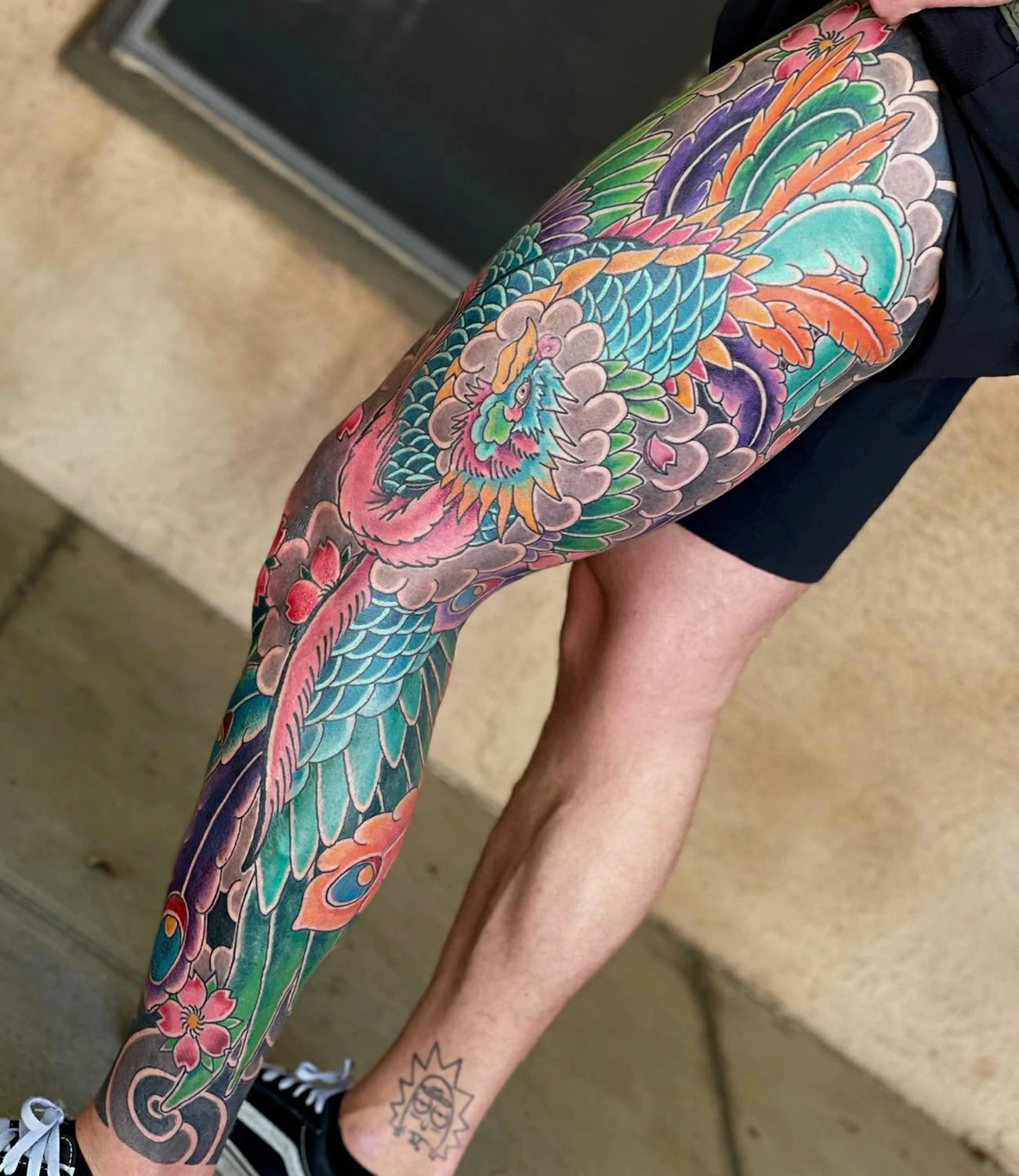
Japanese octopus tattoo
Octopuses are fascinating creatures that hold various meanings in Japanese culture. Japanese octopus tattoos symbolize intelligence, adaptability, and mystery. These tattoos often feature a detailed and intricate octopus design with vibrant colors and dynamic poses. Japanese octopus tattoos are popular for those who want to embrace the enigmatic and powerful aspects of Japanese tattoo art.
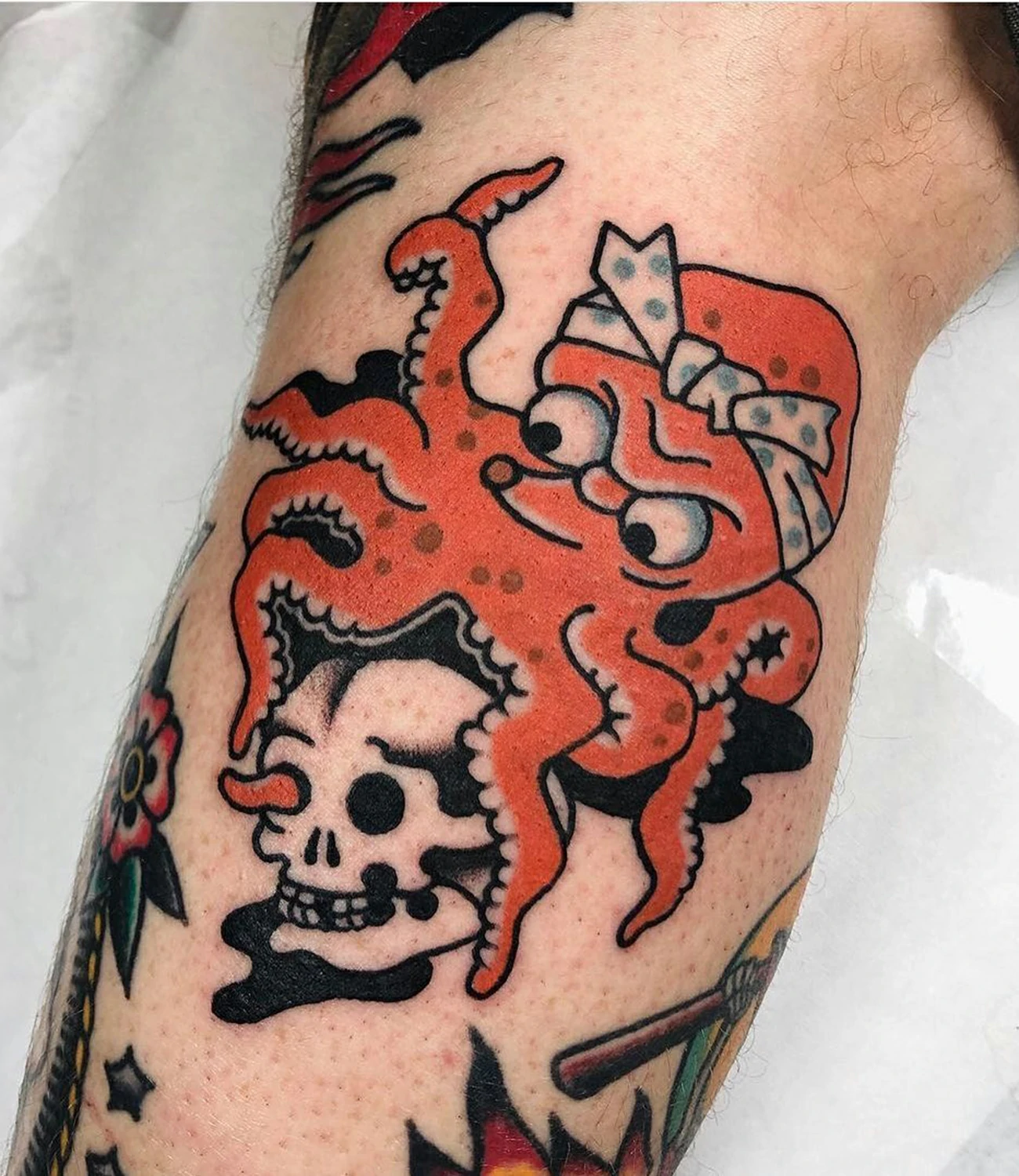
Back japanese tattoo ideas
The back is a famous canvas for large-scale Japanese tattoos. Back Japanese tattoos often feature a combination of different elements, such as dragons, samurai warriors, cherry blossoms, and waves. These tattoos cover a significant portion of the back and require multiple sessions. Back Japanese tattoos are a powerful and visually stunning choice for those who want to show their commitment to Japanese tattoo art boldly.
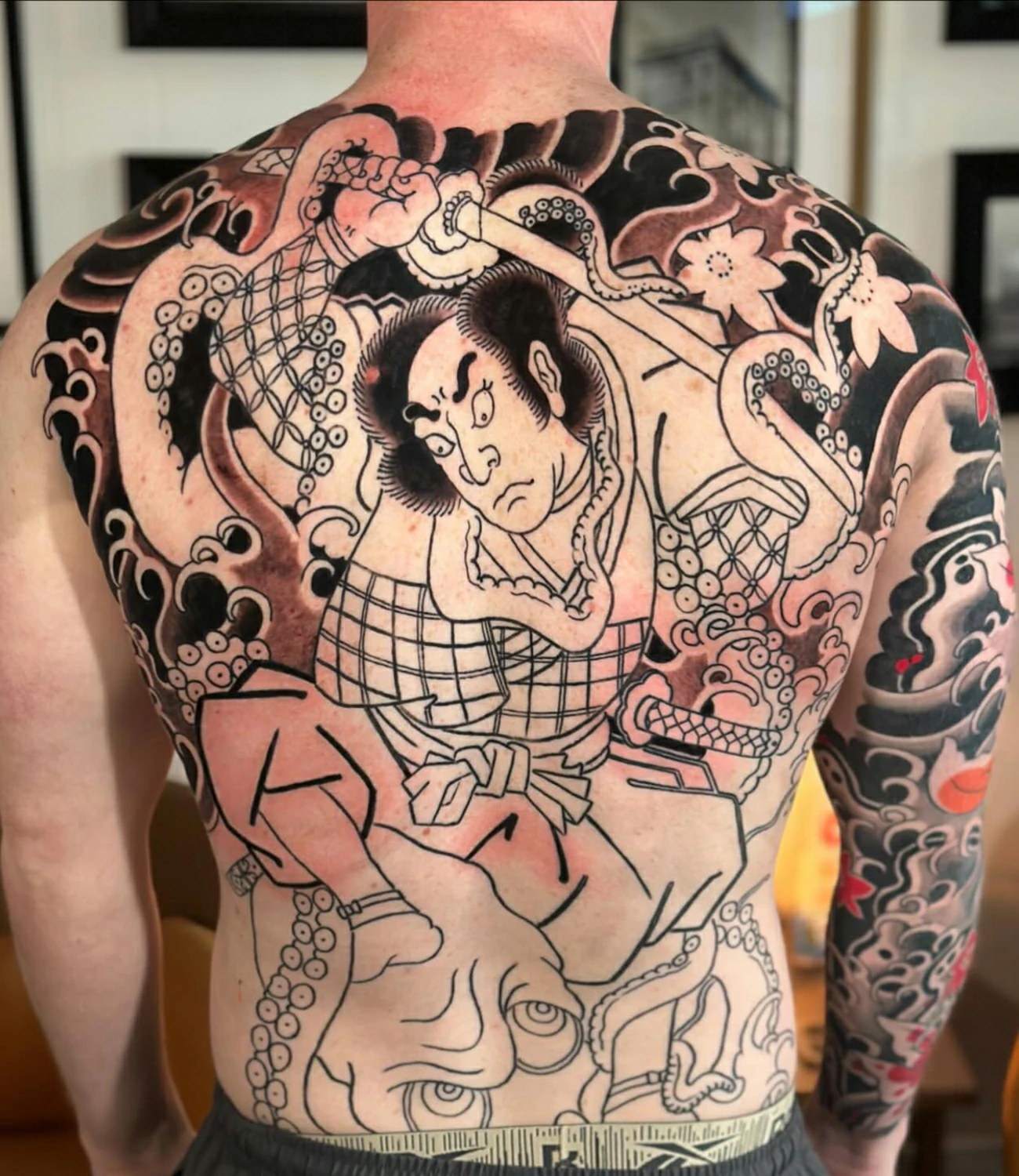
Coy fish japanese tattoos
Koi fish are popular in Japanese tattoo art and hold various meanings. Japanese koi fish tattoos symbolize perseverance, determination, and the ability to overcome obstacles. These tattoos often feature brightly colored koi fish swimming against a backdrop of waves or lotus flowers. Japanese koi fish tattoos are a meaningful and visually striking choice for those who embrace the journey of personal growth and transformation.

Japanese wolf tattoo
Wolves are highly revered in Japanese culture and are associated with loyalty, courage, and protection. Japanese wolf tattoos often depict the animal in a fierce and majestic pose, surrounded by elements like cherry blossoms or clouds. These tattoos are believed to bring strength and ward off evil spirits. Japanese wolf tattoos are a powerful expression of personal values and beliefs.
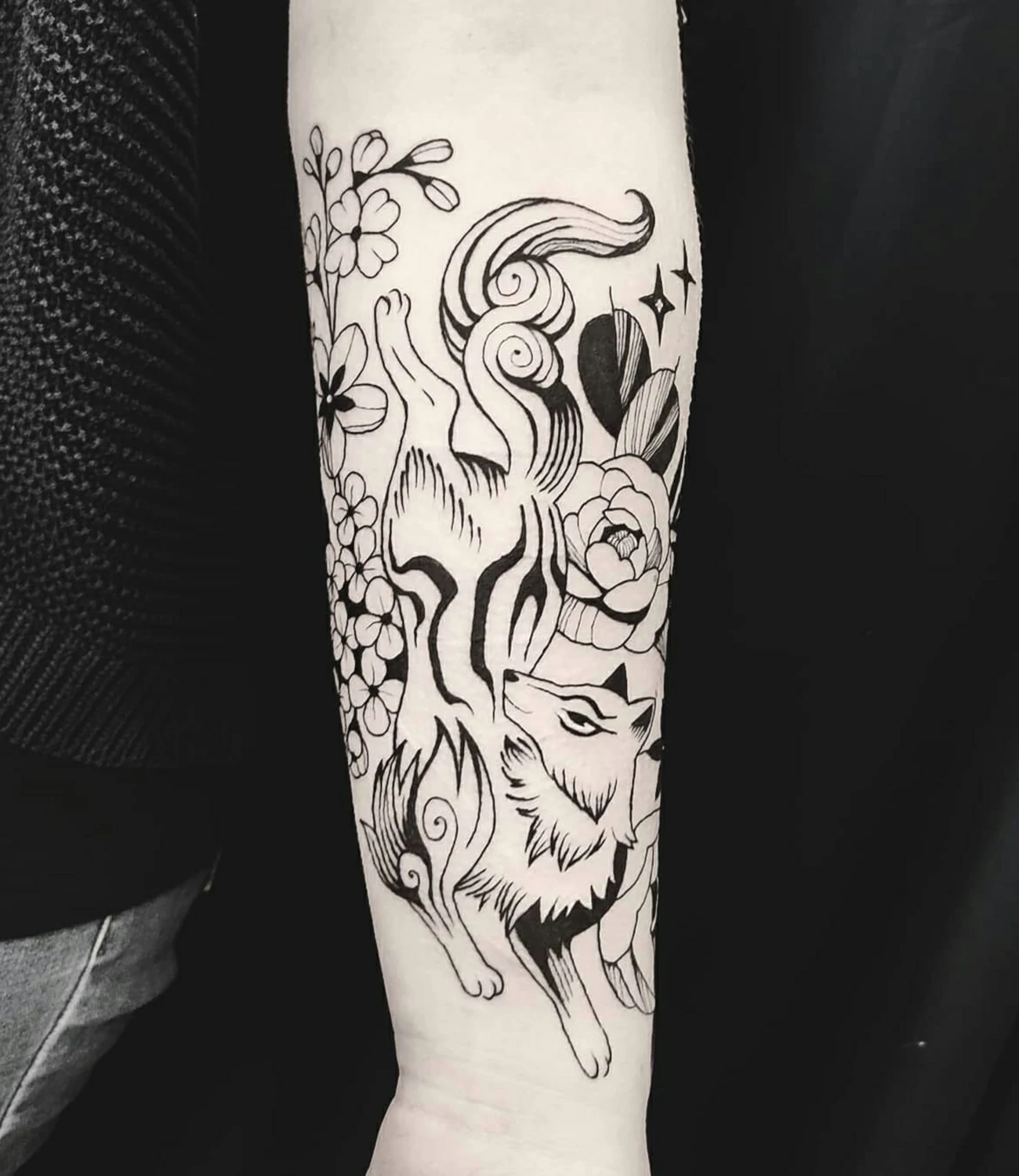
Japanese full-body tattoo
A full-body bodysuit tattoo is a comprehensive and visually stunning expression of Japanese tattoo art. Japanese full-body tattoos often feature a combination of different elements, such as dragons, samurai warriors, cherry blossoms, waves, and masks. These tattoos cover the entire body, from the neck to the feet, and require multiple sessions. Japanese full-body tattoos are a bold and committed choice for those who want to artfully embrace the beauty and symbolism of Japanese tattoos.

Wireless Tattoo Pen Machine with 7 Stroke Length

Meaning and Symbolism of Japanese Tattoos
Japanese tattoos, or “Irezumi,” hold a profound place in cultural expression, intertwining deep meanings and storytelling with intricate designs. These tattoos are not mere decorations but are woven with the cultural fabric of Japan, often reflecting personal beliefs, values, and the collective myths of society.
Common Symbols and Their Meanings
Japanese tattooing is rich with symbols derived from the nation’s mythology, folklore, and art, each carrying distinct meanings and attributes. Here are some of the most emblematic symbols:
- Dragons: Symbolizing wisdom, strength, and benevolence, dragons in Japanese tattoos are depicted as majestic and powerful creatures that can manipulate cosmic forces for the benefit of people, contrasting with their often malevolent Western counterparts.
- Koi Fish: These are symbolic of perseverance and strength. A typical depiction is of the koi swimming upstream, overcoming obstacles, which serves as a metaphor for personal struggle and triumph.
- Phoenix: Known for its cycle of rebirth, the phoenix symbolizes immortality, renewal, and resurrection. It’s often drawn rising from ashes, representing triumph over adversity.
- Samurai: Embodying honor, discipline, and loyalty, samurai tattoos often feature warriors in armor, symbolizing a preparedness to defend one’s principles.
- Cherry Blossoms: These delicate flowers, or “Sakura,” represent the transient nature of life, a central theme in Japanese philosophy, highlighting the beauty and fragility of existence.
- Hannya Masks: These are used to depict the complexities of human emotions, representing states like jealousy and rage, and are often used to convey the darker aspects of the human psyche.
Each symbol within a Japanese tattoo narrates part of a larger story, often interwoven with other elements to create a tapestry of personal and cultural significance.
Cultural Significance
The cultural significance of Japanese tattoos extends beyond their aesthetic appeal. Historically, tattoos in Japan were associated with status and achievements and, at times, used as spiritual protection against evil. For instance, the full-body suits of tattoos, which are still popular today, originated from the Edo period and were often worn by firefighters as a form of spiritual protection.
Moreover, the art of Irezumi was once closely associated with the Yakuza, Japan’s organized crime syndicates, who adopted tattoos as a mark of their identity and loyalty. However, in contemporary times, the perception of Japanese tattoos has shifted significantly. They are increasingly seen as a form of art and self-expression, transcending their earlier associations.
Understanding these symbols and their backgrounds allows individuals to appreciate not only the artistry involved in Japanese tattooing but also the deep cultural roots that these tattoos represent. Engaging with this tradition offers a meaningful way to connect with the rich historical and cultural narratives of Japan, making each tattoo a personal and profound statement.
Popular Japanese Tattoo Styles
Japanese tattooing is a profound art form that spans various styles, each with its own historical and cultural significance. We’ll explore some of the most popular styles that are cherished both in Japan and around the world.
Traditional Irezumi
Traditional Irezumi is a classic style that has been practiced for centuries in Japan. This style is known for its full-body artworks, including the notorious full-body suits that cover large parts of the body from the shoulders down to the knees. Irezumi is deeply intertwined with Japanese culture and often features motifs such as dragons, tigers, and the famous koi fish, each symbolizing different traits and stories. Historically, Irezumi was associated with the samurai and the yakuza, serving as symbols of bravery, status, or even punishment. The art of Irezumi was traditionally done by hand, a technique known as Tebori, which involves using bamboo sticks and metal needles.
This method is still practiced today by some artists who wish to preserve traditional craftsmanship.
Neo-Japanese Tattoos
Neo-Japanese tattoos represent a modern evolution of the traditional Irezumi, incorporating vibrant colors and blending classic Japanese motifs with contemporary tattooing techniques. This style retains the flow and composition of traditional Japanese tattoos but often introduces modern elements or themes, making it popular among younger generations and non-traditionalists. Neo-Japanese tattoos continue to honor the aesthetic principles of Japanese art, such as the use of wind bars, waves, and flowers to create a harmonious design that flows with the body.
Modern Trends
In recent years, the Japanese tattoo landscape has seen innovative trends that push the boundaries of the traditional art form. Modern Japanese tattoos often mix elements from both traditional Japanese and Western tattooing, creating unique and personalized artwork. These tattoos might incorporate less conventional colors, hybrid symbols, or even elements from pop culture and other art forms. Despite their modern twist, these tattoos often maintain the core principles of Japanese tattooing, such as detailed shading and a deep respect for the body as a canvas.
Each of these styles offers a unique way to experience and appreciate the rich tradition of Japanese tattooing. Whether you are drawn to the historical depth of Traditional Irezumi, the vibrant adaptation of Neo-Japanese, or the innovative approach of modern trends, Japanese tattoos provide a captivating way to express personal narratives and artistic appreciation.
Famous Japanese Tattoo Motifs
Cherry Blossom
Cherry blossoms, or “sakura,” are profoundly symbolic within Japanese culture, representing the ephemeral nature of life—blooming brilliantly and shortly fading away. This motif in tattoos often captures the blossoms at their peak, embodying the beauty of transience. In Japanese tattoos, the cherry blossom is a reminder to cherish each moment, reflecting themes of mortality and the fleeting beauty of life. The flower is also tied to themes of renewal and the cyclical nature of life, often marked by their vibrant bloom during spring.
Dragon
The dragon, or “Ryu,” holds a significant place in Japanese tattoo art, symbolizing wisdom, strength, and benevolence. Unlike Western interpretations, where dragons are often seen as evil, Japanese dragons are considered protectors of humanity, using their strength to do good. These creatures are depicted in various colors, like black, representing wisdom; green, for nature; gold, for value and virtues; and blue, for gentleness. Each color and style, from the twisting sea dragons to the more mythical creatures with detailed scales and claws, reflects different traits and stories, making them a popular choice among those seeking tattoos with deep meaning and cultural heritage.
Samurai
Samurai tattoos are a tribute to the virtues of courage, discipline, and loyalty. These designs often feature samurai in full armor, ready to defend their honor and principles. The samurai motif is not only a celebration of Japanese history and heritage but also a representation of the warrior spirit. By incorporating elements like cherry blossoms and dragons, these tattoos also narrate stories of bravery and the noble aspects of the samurai life, making them symbolic of personal and cultural strength.
Geisha
Geisha tattoos encapsulate beauty, grace, and the artful existence that defines much of Japanese culture. These tattoos often portray geishas in traditional attire with elements like fans and kimonos, surrounded by cherry blossoms or koi fish, adding layers of meaning. Geishas are seen as muses, embodying femininity, refinement, and sophistication, and their depiction in tattoos celebrates these qualities. This motif is famous for its aesthetic appeal and the deeper connection it offers to the rich cultural fabric of Japan.
Each of these motifs carries its own unique symbolism and aesthetic appeal, making them not just art forms but also representations of deeper cultural values and personal narratives. Whether one chooses the fleeting beauty of the cherry blossom, the protective power of the dragon, the honor of the samurai, or the elegance of the geisha, these motifs offer a way to connect deeply with Japanese culture and personal identity through the medium of tattoos.
How to Choose the Right Japanese Tattoo for You
Choosing the right Japanese tattoo involves a deep personal connection, thoughtful design customization, and effective consultation with a skilled artist. Here’s how you can navigate these essential steps to ensure your Japanese tattoo is both meaningful and beautiful.
Personal Connection
Japanese tattoos are profoundly intertwined with personal stories and cultural significance. They serve as more than just body art; they are a reflection of individual beliefs, experiences, and the narrative you wish to carry with you. For instance, the symbolism of a koi fish overcoming obstacles might resonate with those who have experienced significant personal growth. Similarly, a cherry blossom could symbolize the beauty and transience of life, echoing personal or philosophical reflections. It’s essential to choose a motif that not only appeals visually but also connects deeply with your personal story or values.
Design Customization
The process of designing a Japanese tattoo should be a collaborative effort between you and your tattoo artist. This collaboration ensures the design not only fits well with your aesthetic preferences but also respects the traditional elements of Japanese tattooing.
For example, suppose you are drawn to the symbolism of the samurai. In that case, discussing how to incorporate this motif in a way that complements your personal narrative and body flow is crucial. Customization might include choosing specific symbols, colors, and scales that align with the intended placement on your body. It’s important to consider how the design will flow with the body’s natural curves, utilizing elements like waves or windbars to enhance the overall cohesion of the tattoo.
Consulting with an Artist
Finding the right tattoo artist is crucial in bringing your Japanese tattoo to life. It’s advisable to select an artist who not only has expertise in Japanese tattooing but also one with whom you can build a solid communicative relationship. Consultations are a critical part of the tattoo process, where you can discuss your vision, receive professional advice, and make adjustments to the design. During these consultations, be open about your expectations and listen to the artist’s suggestions. They can offer valuable insights into the placement, size, and colors that would best suit your design. Remember, a good tattoo artist will be interested in ensuring the tattoo not only looks spectacular but also holds personal significance for you.
By focusing on these critical aspects—personal connection, design customization, and artist consultation—you can ensure that your Japanese tattoo is not only visually striking but also a meaningful expression of your personal journey and cultural appreciation.
Conclusion
Embarking on the journey of selecting a Japanese tattoo is an exploration of a rich cultural landscape that intertwines deeply with personal narratives and artistic expression. This guide has navigated through the significance of Japan’s most iconic tattoo symbols and motifs, shedding light on their meanings and the stories they tell. Each symbol, from the enduring strength of the dragon to the fleeting beauty of the cherry blossom, offers a unique pathway to expressing one’s identity and values through the ancient art of Irezumi. Moreover, the exploration of various Japanese tattoo styles, from the traditional to the contemporary, provides a framework for understanding how these designs can serve as a canvas for personal stories and cultural homage.
Choosing a Japanese tattoo, therefore, goes beyond mere aesthetics, delving into a symbiotic relationship with history, culture, and self-expression. It is a decision that marries the beauty of traditional art with individual significance, encouraging a thoughtful selection process that respects the depth of the symbols involved. By engaging with Japanese tattooing, individuals not only adorn their bodies with visually striking artwork but also wear a piece of cultural heritage that carries profound personal meanings. As one considers embarking on this artistic journey, the importance of connection, customization, and consultation with skilled artists cannot be overstated, ensuring that the chosen tattoo resonates on a profoundly personal and cultural level.
FAQs
1. What is considered the most iconic Japanese tattoo design? Koi fish tattoos are widely recognized as iconic in Japanese tattoo art. These designs are not only popular in Japan but globally, symbolizing bravery and success. A red koi fish tattoo, in particular, is believed to attract love to the wearer.
2. What are the essential guidelines for creating a Japanese tattoo? There are several important guidelines to follow when getting a Japanese tattoo:
- Rule One: The tattoo should be large, often covering a significant portion of the body or an entire body part.
- Rule Two: Incorporate traditional themes and symbols that reflect Japanese culture.
- Rule Three: The design and application process should adhere closely to traditional Japanese methods.
3. Is it culturally respectful to get a Japanese tattoo? While anyone can appreciate the beauty of Japanese tattoos, it’s crucial to understand their deep roots in Japanese culture and history. These tattoos carry significant meanings and should not be adopted lightly or merely as a fashion statement. Misusing these designs can be viewed as cultural appropriation and disrespectful.
4. What meanings are typically conveyed by Japanese tattoos? Japanese tattoos often feature symbols and motifs from mythology, folklore, and art, conveying messages of protection, bravery, and good luck. They are designed to be large and elaborate, telling a story or representing profound life themes.
